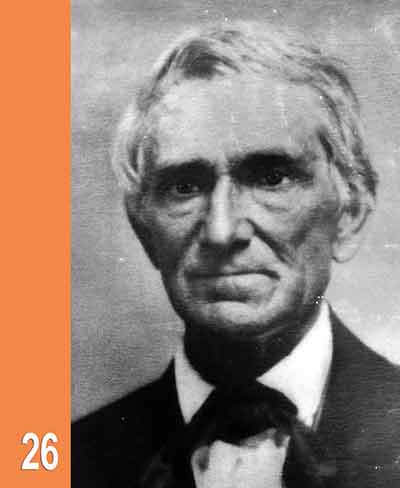Frederick Steidinger Heiskell
Induction Year: 1981
Lived:¬Ý1786-1882
Papers:
Knoxville Gazette; Western Monitor and Religious
Observer, Knoxville; Knoxville Register
Frederick Steidinger Heiskell moved to Knoxville in 1814 as a journeyman printer. Within two years he was co-owner of his own newspaper, the Knoxville Register, and before retiring from the business about 21 years later he had become one of the most influential publishers in the state.
He had learned the printing trade in his brother's shop in Winchester, Va., but it was apparent that he did not intend to remain just a printer for long. While working in the shop of George Wilson's Gazette in Knoxville, he sought to purchase the newspaper. When that effort failed, Heiskell and his brother-in-law, Hugh Brown, established the Register on Aug. 3, 1816.
Two years later Wilson moved his Gazette to Nashville and the Register became Knoxville's only newspaper. In fact, it was the only pioneer newspaper to survive and gain wide influence during its 47 years. Heiskell and Brown also published the Western Monitor and Religious Observer from 1818 to 1820, shared the role as state printer with several other publishers for a number of years and published numerous books and pamphlets, including a Cherokee spelling book.
But it was as editor and publisher of the Register that Heiskell rose to power and influence in the state. Politics intrigued him and he used the columns of the Register to champion both candidate and cause. As a result, he became a close friend and political ally of such nationally prominent men as Andrew Jackson, Henry Clay and James K. Polk. An enthusiastic supporter of Andrew Jackson in the contest with John Quincy Adams, Heiskell broke with Old Hickory in the presidential campaign of 1836. He supported Hugh Lawson White for president rather than Jackson's hand-picked successor, Martin Van Buren.
Using his editorial columns with consummate skill, Heiskell campaigned relentlessly for White. When the often bitter election was over, White had 39,500 Tennessee votes to Van Buren's 21,500. White had carried every county in the state except Greene, Sullivan and Washington. Four years earlier Jackson had carried East Tennessee county. Some historians say the results of the 1836 contest in Tennessee show the Register to be the most influential newspaper ever published in Knoxville.
Heiskell, who became sole owner of the Register when Brown left in 1829, had many other interests beyond politics. He became a tireless campaigner for public education and civic improvement, backing his editorial support with service on countless boards and commissions.
He was one of the founders, and for many years treasurer, of the Knoxville Public Library. He served as a trustee of the Knoxville Female Academy and its successor, the East Tennessee Female Institute, from 1827 until his death in 1882. He was also a trustee of East Tennessee College, now the University of Tennessee. And he served on the Knoxville Board of Mayors and Aldermen from 1825 until 1831. He was mayor for a brief period in 1835.
In 1837, Heiskell sold his interest in the Register to W.B.A. Ramsey and Robert Craighead and retired to Fruit Hill, his sprawling 1,000-acre farm southwest of Knoxville. He returned to public life in 1847 when he was elected to the State Senate. He was described as a "bold, independent and thoroughly incorruptible" senator. Heiskell returned to Fruit Hill where he lived until his second wife's death in 1874. He moved back to Knoxville and finally to Rogersville where he died in 1882.
